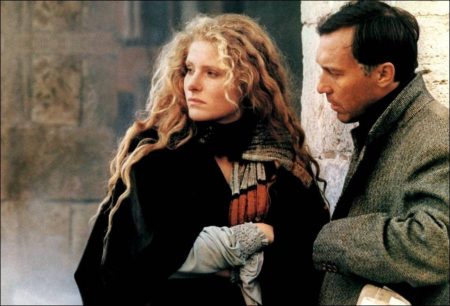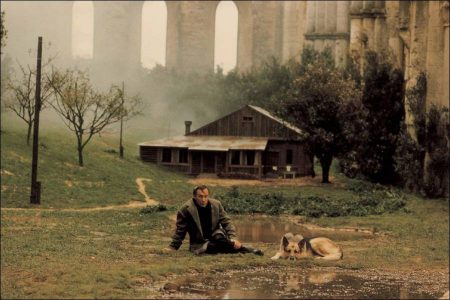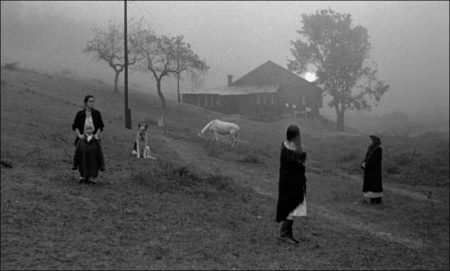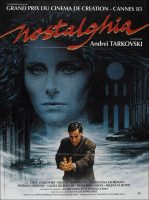Nostalghia movie storyline. The Russian poet Andrei Gorchakov, accompanied by guide and translator Eugenia, is traveling through Italy researching the life of an 18th-century Russian composer. In an ancient spa town, he meets the lunatic Domenico, who years earlier had imprisoned his own family in his house for seven years to save them from the evils of the world. Seeing some deep truth in Domenico’s act, Andrei becomes drawn to him. In a series of dreams, the poet’s nostalgia for his homeland and his longing for his wife, his ambivalent feelings for Eugenia and Italy, and his sense of kinship with Domenico become intertwined.
Nostalghia (UK: Nostalgia) is a 1983 Soviet-Italian drama film directed by Andrei Tarkovsky and starring Oleg Yankovsky, Domiziana Giordano, and Erland Josephson. Tarkovsky co-wrote the screenplay with Tonino Guerra. The film depicts a Russian writer (Oleg Yankovsky) who visits Italy to carry out research about an 18th-century Russian composer, but is stricken by homesickness. The film utilizes autobiographical elements drawn from Tarkovsky’s own experiences visiting Italy, and explores themes surrounding nostalgia and the untranslatability of art and culture.
Nostalghia is Russian director Andrei Tarkovsky’s enigmatic work about a writer (Oleg Yankovsky) who, trapped by his fame and an unhappy marriage, seeks out his cultural past in Italy. Here he meets Erland Josephson, a local pariah who declares that the world is coming to an end. The writer finds this prophecy curiously more alluring than the possibility of a dead-end future. Nostalghia won the Prize of the Ecumenical Jury, the prize for best director and the FIPRESCI Prize at the 1983 Cannes Film Festival. The film received nine total votes in the 2012 Sight & Sound polls of the greatest films ever made.
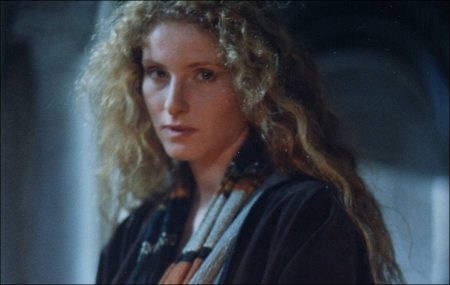
A Talk with Tarkovsky on Nostalghia
The following is a transcript of a tape-recorded interview with Andrei Tarkovsky, conducted by Gian Luigi Rondi on April 15, 1980. Reference: Il Cinema dei Maestri (The Cinema of the Masters), by Gian Luigi Rondi, Rome, Rusconi Editore, 1980. This interview was translated from Italian into English exclusively for Nostalghia.com by David Stringari of Fairfield, Connecticut, U.S.A.
Andrei Tarkovsky, one of the greatest and most acclaimed auteurs of the contemporary Soviet cinema, and perhaps one of the major filmmakers of the entire world, is in Rome to define with RAI the film that he will realize in Italy in collaboration, for the screenplay, with Tonino Guerra.
Is the title now definitive?
TARKOVSKY: I think so, yes. Initially we had considered Viaggio in Italia (Voyage to Italy), but since there was already the film by Rossellini, with Ingrid Bergman, which bore that title, we searched for something else. The title we have decided upon is Nostalghia, a word that is similar both in Russian and Italian, the only difference being that in Russian it is pronounced with a hard “g”.
And the nostalgia, as you told me the other night as you arrived at the Fiumicino Airport, is that of a Russian who is displeased that he cannot share with his family, which has remained in Moscow, the joy of the encounter with Italian art?
Well, expressed in that way it is just the kind of summary one makes in an airport as one is collecting one’s baggage and hurriedly placing his suitcases on a cart. No. The film, in fact, will deal with various problems and has many themes. The protagonist is a Russian intellectual. In Moscow, or in Leningrad, Tonino Guerra and I have still not yet specified this point, he teaches history of Italian Rennaissance architechture at a university. He is a great specialist, appreciated by everyone, even though he has never set foot in Italy because he constructed his science, his culture, solely through books.
One day, for research purposes, he decides to come to Italy, assisted by an interpreter who must accompany him to all the inspections of palaces and monuments that he plans to make. He begins his visits, he looks, he studies, and very soon thereafter he enters into crisis. Everything that he knew, in fact, seems to no longer have any sense for him, it seems dead, empty. Contained in those monuments,
in those palaces, is the heart and soul of those who made them, who conceived them, and around them are the people who don’t see them in an abstract way but in concrete terms, because they live there or experience them, because they are part of their daily panoramas, of the rythms of their existence. And thus all meanings change, all surroundings, as if revealing different themes and measures. What did the professor know of all this? Nothing. Thus he did not know the essential, the true juice of those monuments, of that art that he had read about in books, that he had seen only in photographs.
It is also a bit the problem of reproductions, of translations...
Precisely. The only art that reaches everyone directly is music. The others, if you are not in the midst of them, if you don’t experience them, they have only barriers surrounding them. Take a poem and translate it. The language, the sound, the spirit will immediately be different, it will be a different poem, not that one, because you will never be able to say, on the basis of a simple translation, that you have reached the heart of the poet, the secret of his soul, the true essence of the way that he expresses himself.
And so it is for reproductions. A monument… Certainly, a photograph might contain all that appears, the lines, style, even the indication of the proportions… But the air that circulates around it, the light on that day, in that hour, the eyes of those who see it and walk near it, at times without even realizing where they are? And instead it is these that give that monument its truest meaning, its dimensions, its artistic secret… Photographic reproduction, translation… Art cannot manage to move inside it, it is there, imprisoned, and an imprisoned art, yes, certainly, is always a betrayed art.
And so?
And so, given this problem, it is necessary to attempt to arrive at a solution, and there can only be one solution, contact, communication. Art is culture, culture is the soul and memory of the people. There must be the possibility to transmit, to communicate culture: because only through this communication, this exchange, can man arrive at his entirety.
However much you may be convinced that you have achieved a certain level of fullness, however much you may have experienced and studied, if you ignore that which there is elsewhere, if you lack that which cultulre has given to others far from you, you are lacking something, you are not complete, you cannot truly say that you have achieved the fullness which defines a true, whole, complete man. Culture is like blood, it must circulate, and it must circulate normally everywhere. Otherwise what happens is what occurs in a body when blood does not circulate in some point: gangrene immediately develops.
But what about nostalgia?
It becomes a universal problem. In Italy, the professor is alone. Obviously, he does not have his family with him, he does not have his students with him. The discoveries that he makes, starting above all with the discovery that he knows nothing and that thus his teaching is useless, are useful only to himself because they are not sensations, experiences, that can be transmitted in a classroom or, worse, printed in books, because it is absolutely necessary to experience them, and experience them together.
So, as I already told you at the Fiumicino Airport, he has a sort of crisis of rejection, with regards to everything that surrounds him. That research trip—research and study only for himself—suddenly no longer seems to make any sense to him and he interrupts it. He still has some monuments, some buildings, to visit, but he refuses, he stops. Precisely because he has discovered the importance and the necessity of communication, of contact, he does not feel like being the only one to profit from it. Because it would in fact be like letting the blood circulate only partially in his body…
And how will you narrate all of this?
With Tonino Guerra, we have tried to develop these moral themes in the same manner that cinema generally develops the practical themes of hunger, hatred, violence, death. In order to arrive at evoking the same tensions, the same emotions.
Do you already have an idea of the images with which you will visualize these themes?
If possible, they will be even more simple and essential than those of Stalker, with the renunciation of technical gimmicks, of special effects. A man and the life around him, a man in reality. A recreated reality, naturally, not a copied one. I do not believe in a cinema that copies.
A realism of dream, like that of Mirror?
There isn’t “realism” on the one hand, and on the other hand (in contrast, in contradiction) “dreams.” We spend a third of our life asleep (and thus dreaming): what is there that is more real than dreams?
Then how would you explain the style which you have in mind for Nostalghia?
I refer once again to Stalker. There is a place there, the Zone, which is and is not, it is reality and, at the same time, it is a place of the soul, of memory. In the film, when you see it, it is a forest, a river. That’s all. But the air that circulates, the light, the rythms, the perspectives, without distorting anything, make you feel it as an “other” place, with various dimensions, always real and, at the same time, different.
The last time that I came to Italy to begin studying the project of Nostalghia, together with Tonino Guerra I visited many of your cities, also to have a precise idea of Rennaissance architecture, of your Art. Tonino would show me this or that monument, I looked, admired, took notes, but then what always struck me most was the sky, your blue sky, black sky, with clouds, with the sun, at dawn, at noon, in the evening. The sky, a sky is always just that, but all it takes is a different hour of the day, the wind, a change in climate, for it to speak to you in a different way, with love, with violence, with longing, with fear. Cinema can give these “ways” back to you, it must. With courage, and honesty, always starting from the real.
Have you already chosen the actors and the technicians?
For now only the protagonist, who, as in Andrei Rublov and Stalker, will once again be Anatoli Solonytsin. The others, obviously, will all be Italians, except for the ones who will act in the scenes to be filmed in the Soviet Union—the professor’s memories. We will discuss with RAI with regards to the technicians.
In any case, I am considering Luciano Tovoli for director of photography [Translator’s Note: Tovoli, whose work Tarkovsky had admired in Antonioni’s The Passenger (1975), served as cinematographer on Tarkovsky’s 1982 documentary for Italian television Tempo di Viaggio (Travelling Time). Tarkovsky would eventually choose Giuseppe Lanci to serve as cinematographer on Nostalghia].
Nostalghia (1983)
Directed by: Andrei Tarkovsky
Starring: Oleg Yankovsky, Erland Josephson, Domiziana Giordano, Delia Boccardo, Patrizia Terreno, Domiziana Giordano, Milena Vukotic, Raffaele Di Mario, Elena Magoia, Piero Vida
Screenplay by: Tonino Guerra, Andrei Tarkovsky
Production Design by: Andrea Crisanti
Cinematography by: Giuseppe Lanci
Film Editing by: Erminia Marani, Amedeo Salfa
Costume Design by: Lina Nerli Taviani
Set Decoration by: Mauro Passi
MPAA Rating: None.
Distributed by: Gaumont Italia (Italy), Gaumont (France), Grange Communications, Inc. (United States)
Release Date: May 1983 (France)
Views: 287
